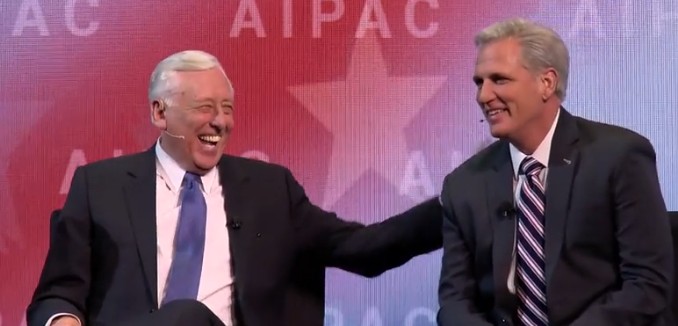In an indication of bipartisan support for fixing the nuclear deal with Iran, a top Democratic lawmaker, said that he agreed with a Republican colleague, and favors “renegotiation” to make the deal “permanent,” at the AIPAC Policy Conference on Monday.
Rep. Steny Hoyer (D – Md.), the House Democratic Whip, who supported the nuclear, made the comments in a conversation with Rep. Kevin McCarthy (R – Calif.), the House Majority Leader, that was moderated by AIPAC Managing Director of Policy and Politics Arne Christenson.
Hoyer, acknowledging that though he didn’t oppose the deal at the time like McCarthy did, said he agreed with McCarthy now.
“That agreement clearly should have dealt, in my opinion with the nonnuclear malign destabilizing activity that Iran precipitates,” Hoyer said, “It also should have dealt with a permanent solution, not a temporary solution. So, I’m supportive, as Kevin is, of us moving towards renegotiation, cooperating with our European partners.”
The goal, he added, would be to ensure that “Iran never – not just for seven years, 10 years, 25 years – never has a nuclear capability that can threaten Israel, the Middle East, or the world.”
In January, President Donald Trump stated that he had waived sanctions on Iran for the last time unless the nuclear deal was fixed, giving Congress and America’s European allies until May to address the weaknesses in the deal, or he would withdraw the United States from the deal.
The flaws identified by Trump include insufficient restrictions on Iran’s ability to develop ballistic missiles capable of delivering nuclear weapons, no way of ensuring inspections of Iran’s military sites, and sunset clauses that allow Iran to develop an industrial strength uranium enrichment program in a decade’s time.
Currently, there is legislation in the House of Representatives, which has been described by sanctions expert, Richard Goldberg, as the “gold standard.” Goldberg explained that the legislation “mandates a snapback of all our toughest sanctions if Iran violates that Security Council directive” not to develop ballistic missiles.
Despite the United Nations Security Council Resolution which implemented the deal calling on Tehran not to develop ballistic missiles, Iran has launched at least 23 such missiles since agreeing to the nuclear deal.
[Photo: AIPAC]




